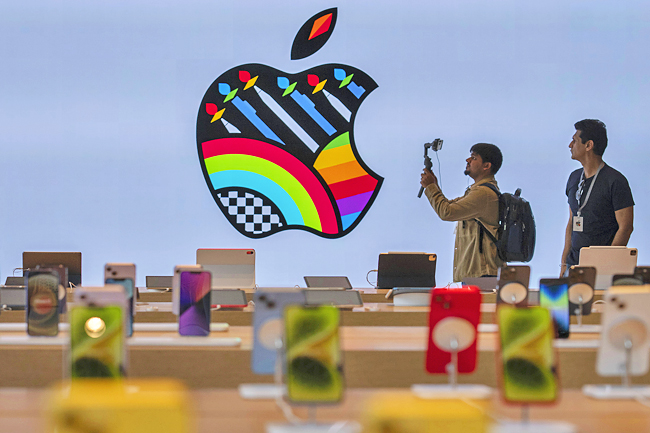NEW DELHI (AP) – Apple Inc opened its first flagship store in India in a much-anticipated launch yesterday that highlights the company’s growing aspirations to expand in the country it also hopes to turn into a potential manufacturing hub.
The company’s CEO Tim Cook posed for photos with a few of the 100 or so Apple fans who had lined up outside the sprawling 20,000-square-foot store in India’s financial capital, Mumbai, its design inspired by the iconic black-and-yellow cabs unique to the city. A second store will open tomorrow in the national capital, New Delhi.
“India has such a beautiful culture and an incredible energy, and we’re excited to build on our long-standing history,” Cook said in a statement earlier.
The tech giant has been operating in India for more than 25 years, selling its product through authorised retailers and the website it launched a few years ago. But regulatory hurdles and the pandemic delayed its plans to open a flagship store.
The new stores are a clear signal of the company’s commitment to invest in India, the second-largest smartphone market in the world where iPhone sales have been ticking up steadily, said analyst at Convergence Catalyst Jayanth Kolla.
The stores show “how much India matters to the present and the future of the company”, he added.

For the Cupertino, California-based company, India’s sheer size makes the market especially encouraging. About 600 million of India’s 1.4 billion people have smartphones, “which means the market is still under-penetrated and the growth prospect is huge”, said Vice President of Research at technology market research firm Counterpoint Research Neil Shah.
Between 2020 and 2022, the Silicon Valley company has gained some ground in the smartphone market in the country, going from just about two per cent to capturing six per cent, according to Counterpoint data.
Still, the iPhone’s hefty price tag puts it out of reach for the majority of Indians.
Instead, iPhone sales in the country have thrived among the sliver of upper-middle-class and rich Indians with disposable incomes, a segment of buyers that Shah says is rising.
According to Counterpoint data, Apple has captured 65 per cent of the “premium” smartphone market, where prices range up from IND30,000 (USD360).
In September, Apple announced it would start making its iPhone 14 in India. The news was hailed as a win for Prime Minister Narendra Modi’s government, which has pushed for ramping up local manufacturing ever since he came to power in 2014.
Apple first began manufacturing from India in 2017 with its iPhone SE and has since continued to assemble a number of iPhone models from the country. Most of Apple’s smartphones and tablets are assembled by contractors with factories in China, but the company started looking at potentially moving some production to Southeast Asia or other places after repeated shutdowns to fight COVID-19 disrupted its global flow of products.



















































